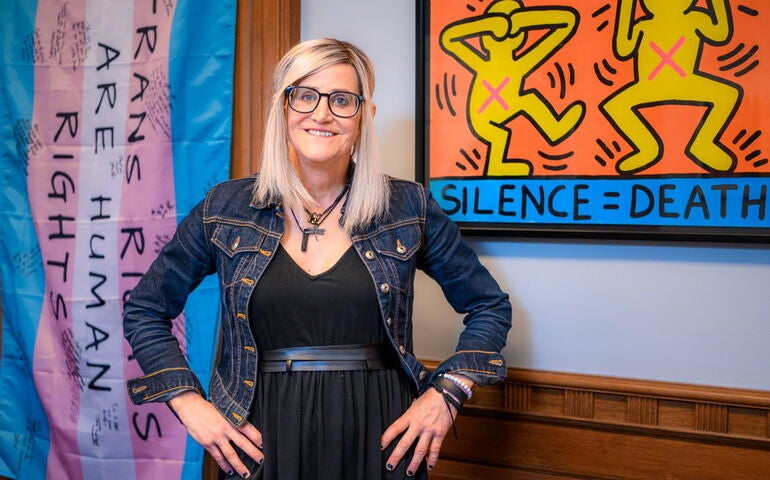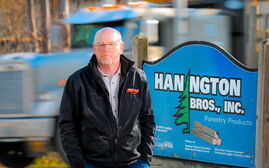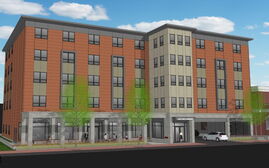On the Record: EqualityMaine executive director calls for more inclusive workplaces
 Photo / Jim Neuger
Gia Drew is executive director of EqualityMaine, a nonprofit advocacy group based out of the Equality Community Center in Portland.
Photo / Jim Neuger
Gia Drew is executive director of EqualityMaine, a nonprofit advocacy group based out of the Equality Community Center in Portland.
Gia Drew, a former high school teacher and track and field coach, is the executive director of EqualityMaine, a Portland-based nonprofit advocacy organization. The group was founded in 1984 as the Maine Lesbian/Gay Political Alliance after the murder of Charlie Howard, a 23-year-old man who was attacked in Bangor for being gay.
Mainebiz sat down with Drew at the Equality Community Center, where preparations for Pride festivities were in full swing.
Mainebiz: What is the mission of EqualityMaine?
Gia Drew: Our mission is to fight for full equality for lesbian, gay, bisexual, transgender and queer Mainers.
MB: How do you define ‘equality’?
GD: We would define it as people can live their lives free from bias, discrimination and violence and just live their lives as anybody else would without that oppression of being LGBTQ+.
MB: How is running a nonprofit different from your previous career?
GD: In my previous career, I was a high school teacher and coach for 20 years, where we maybe had a couple of bake sales along the way to raise money for supplies and field trips. Now you really have to raise every dollar every year to do what you want to do.
MB: What are your funding sources?
GD: We get very little of money from the federal government or state government. Our funding streams are through foundations, where we get grants, and those have increased over the years. We also have business and corporate partners as well as individual donors.
MB: How difficult is it to get donations in today’s highly politicized environment?
GD: Pre-COVID, we had a very robust catalog of business partners who were very eager to be corporate sponsors with their logos affixed to our website and sponsoring our big events, but things have changed. It’s not just local, it’s national, where some companies have become more nervous and more ambiguous about being aligned with LGBTQ+ groups.
MB: What can you share about the programs you offer?
GD: We started the New Leaders Project in 2014, which has really taken off. Our five-day summer camp offers a chance for young people from every county in the state to learn self-empowerment and leadership skills in a safe environment; there are also day camps.
We also run a statewide Network for Older Adults for social connection and advocacy, and got a grant last year from the Maine Health Access Foundation to work with medical and long-term care providers to ensure that older LGBTQ+ folks don’t have to go back in the closet when they age and need more care.
MB: You’ve talked a lot about LGBTQ+ people being ‘invisible’ at work. How so?
GD: This is one fascinating thing that I understand because in my previous career, I was only ‘out’ in my last two years as a teacher; I kept that part of myself quiet.
Nationally, around 46% of LGBTQ+ people are not ‘out’ at work — that’s a very high number. That number has moved a bit, but not substantially, over the last 10 years.
MB: What’s something employers can do right away to be more inclusive?
GD: Just say that ‘we are an accepting workplace,’ and realize that LGBTQ+ people may have faced a history of discrimination in their lives, especially older adults, and they may not feel comfortable about it.
MB: Can you give an example of language that employers can use?
GD: Rather than saying ‘husband’ or ‘wife,’ maybe refer to an employee’s ‘partner.’ Or in addressing a team of people rather than saying ‘ladies and gentlemen,’ maybe ‘hey, folks,’ or ‘hey, you are all wonderful talented people I am happy to work with.’
MB: What’s next for EqualityMaine?
GD: We’re excited to be celebrating our 40th anniversary as a nonprofit and sharing the story that LGBTQ+ people are part of the fabric of Maine. And we’re hopeful that we will be able to meet our mission, that every LGBTQ+ person can live with full equality here in Maine.












0 Comments